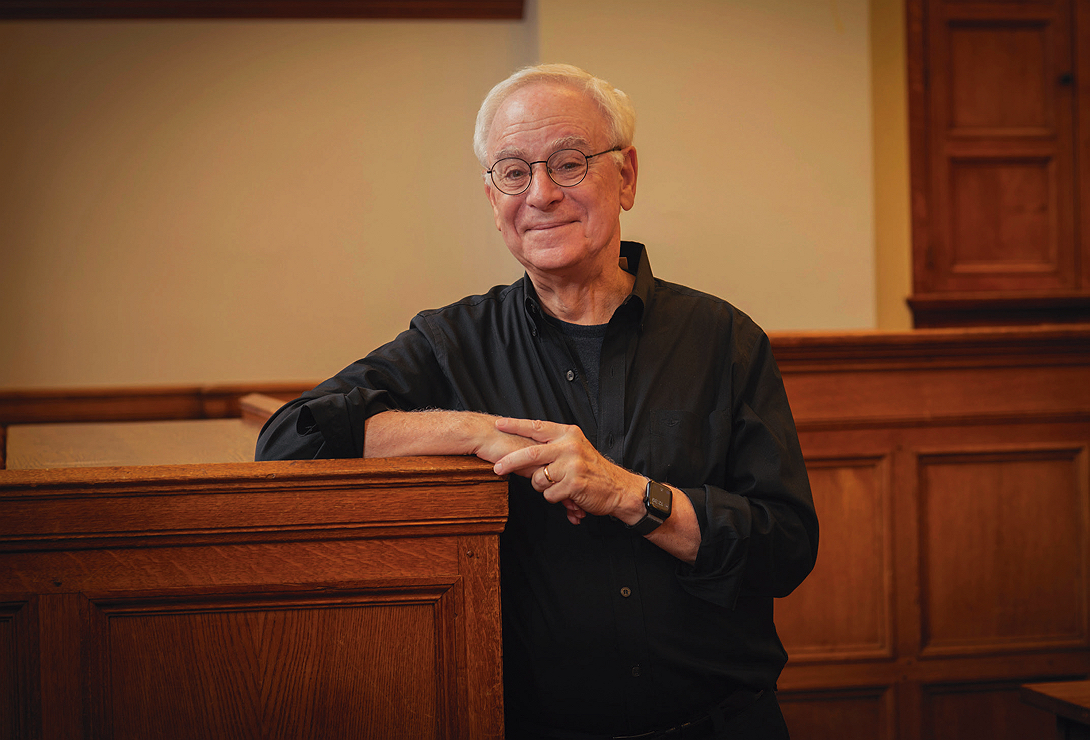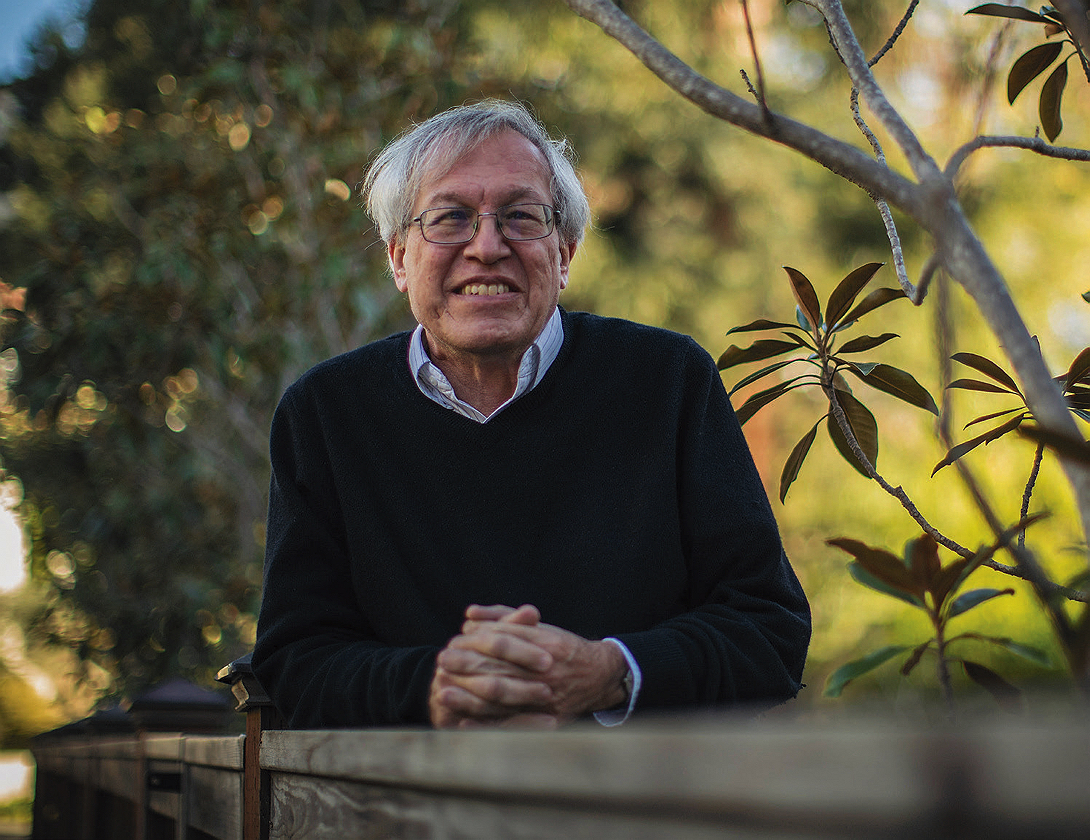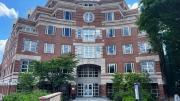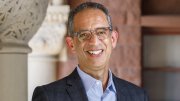The upheaval on American campuses kindled by the Israel-Hamas war has had extreme consequences: resignations of presidents at leading universities, including Harvard; firings of other administrators; discontentment and disciplining of faculty and students; dismay and confusion among alumni; and high-profile, often prosecutorial, congressional hearings.
Deepening this turmoil, two axioms prevail about free speech on campus: everyone knows what free speech is; and free speech is as indispensable there as everywhere else. For Robert C. Post, ’69, Ph.D. ’80, those are far-reaching misconceptions. His ideas reflect his precise and important understanding of academic freedom and freedom of speech.
The essential freedoms, he explains, differ on campus and in the world at large. On campus, there is freedom to discover, develop, and distribute ideas in pursuit of knowledge and diffuse it in education. In the public sphere, there is freedom to debate and deliberate about ideas in expressing and responding to others’ opinions. The former is academic freedom, the latter freedom of speech. Speech has a very different purpose in each sphere, Post explains. Drawing on an exceptional combination of eminent legal scholarship, doctoral training in the humanities, and experience as an academic leader, he maintains that the purpose determines the nature of the freedom.

In the university, the sphere of knowledge, truth-seeking speech is the essential tool. Because of the standards that guide each academic discipline, tenured scholars have the authority to veto the ideas and speech of untenured scholars and students if they don’t meet those standards. In this institutional sense, all that speech in search of truth is not equal.
In the public sphere, however, all individual opinions count as valid contributions in shaping public opinion. John Rawls, Harvard’s great twentieth-century philosopher, said that in public debate, “there are no experts: a philosopher has no more authority than other citizens.” Under the Constitution’s Bill of Rights—the First Amendment’s clause protecting “the freedom of speech”—everyone’s speech about public affairs is equal. Post calls that “public discourse”—“the free flow of ideas in newspapers, in public squares, on debate stages, on theatrical stages, in art galleries and concert halls.”
In the past generation, critics on the right and left have increasingly conflated these principles to argue that, in Post’s words, “universities have failed to protect freedom of expression.” That’s the most tenacious of the many controversies involving academic freedom. As Harvard proclaims in its “Free Speech Guidelines,” “Free speech is uniquely important to the University.”
The strife is about the meanings of academic freedom and of free speech. Politics in general has sometimes bent both concepts to allow for freedom-flouting outcomes (purging as subversives Communists from faculties; prosecuting as traitors journalists who criticize the government). Muddling the principles is especially risky for universities today. Politics often treats universities like any other interest group that needs to be put in its place. Overreaction on social media to those interventions swells the impression that the comeuppance is due.
Politics in the academy has made humility and openness to contrary ideas receding virtues there, too. Clashes can be knotty and nasty. But even in the academy, tensions between the freedoms are often talked about as free speech problems. Post quotes a former president of the University of California when in that office: “we have moved from freedom of speech on campuses to freedom from speech.” With clinical cool, Post writes: “The assumption is apparently that First Amendment protections attach to speech, and that speech occurs within universities.” So speech is an entitlement.
He sees two major problems with this two-step logic. Because of their different purposes—one safeguarding self-government; the other protecting education and advancement of knowledge—those freedoms require “entirely different” frameworks of regulation and protection of speech. Extending free speech protection to all speech uttered in universities (part of what Justice David Souter, ’61, LL.B. ’66, LL.D. 2010, called “speech as such”) means extending protection to some speech that shouldn’t be protected. It’s “a fiction” that the Constitution does so, Post highlights, and “an abuse” of the First Amendment to claim that.
Robert Post's Educational Path
Post, now 76, finished his Harvard Ph.D. dissertation in 1980, in the history of American civilization. (The program changed its name to American studies in 2012.) His path to that point was indirect. Five years after completing college and entering graduate school, he had gone “to learn the lawyer’s profession” at Yale Law School, because he despaired about getting an academic position that would let him do scholarship, teach, and write literary criticism.
His 580-page dissertation, “Studies in the Origins and Practice of the American Romance: Social Structure, Moral Reality, and Aesthetic Form,” explores “the possibilities of human value and significance,” through a study of novels by James Fenimore Cooper and by Nathaniel Hawthorne, reflecting Post’s “fascination with the sea-change that transformed American fiction in the years surrounding the Civil War.” By the time his dissertation was accepted, he was 32 and earning a reputation as an impressive, disciplined lawyer in Washington, D.C., for the renowned litigation firm of Williams & Connolly, where his main clients included The Washington Post. But the Harvard graduate program had kept his ties “with the academic world alive and viable,” and he saw a path for himself in the legal academy.
His brilliance was an obvious factor: he had graduated summa cum laude and Phi Beta Kappa from the College; he was an exceptional graduate student and a dazzling Yale Law graduate; and he had completed prized clerkships with powerful liberals, David L. Bazelon on the U.S. Court of Appeals for the District of Columbia and William J. Brennan Jr., LL.B. ’31, LL.D. ’68, on the Supreme Court. Another factor was the premium that top law schools were putting on Ph.D.s in addition to J.D.s for young professors.
What gives meaning to American lives? How do those lives reveal that meaning? What leads to what Post calls “human flourishing”? Those are overarching questions Post asks in law that he asked as a young scholar in the humanities. He focuses on social practices, or human habits, which reveal culture and give lives meaning, and on the relationship of those practices to social purposes. When purposes evolve, practices inevitably need to change.
In legal scholarship, he pursues that meaning in law and legal norms, especially in the history of the Supreme Court and in constitutional law. For 20 years, he was a star constitutional law professor at what is now Berkeley School of Law, the University of California’s flagship law school. For 22 years, he has been a prized professor at Yale Law School—including eight years as its esteemed dean and, for the past eight, as a Sterling Professor, Yale’s highest academic honor.
Post’s work draws on history, philosophy, political science, and sociology as well as law. What distinguishes his scholarship is how he puts that knowledge to use. Concentrating on culture, and how law and culture shape each other, his work in the law is a kind of anthropology–a study of humanity. But unlike classic anthropologists, describers of what is, Post is also a prescriber of what ought to be. He has used that approach to think through the protections needed to foster expression of opinion and production and diffusion of knowledge.
Free Speech versus Academic Freedom
Free speech shapes public opinion, or consensus, which, wrote Judge Learned Hand, A.B. 1893, LL.B. ’96, LL.D. 1939, “is the final source of government in a democratic state.” Democracy answers to public opinion: the First Amendment prohibits the government from telling people what to think or say, Post explains, to ensure that citizens “set the agenda for government action rather than the reverse.” The successful functioning of democracy, he expands, “requires that the speech of all persons be treated with toleration and equality.” Free speech is anti-majoritarian in its protection of all individuals, however marginalized or minor in number, from majority prejudice or oppression.
But opinion is often the nemesis of knowledge. The university is not a democracy. Neither public opinion nor the government controls the development of knowledge. The successful production of knowledge “requires that speech be subject to a disciplinary authority that distinguishes good ideas from bad ones,” as Post puts it: disciplines require hierarchy. They “are grounded on the premise that some ideas are better than others; disciplinary communities claim the prerogative to discriminate between competent and incompetent work.”
Teaching requires competence in a discipline, and the care of thoughtful instruction, he amplifies: “no competent teacher would permit a class to descend into name-calling and insults”; and “professors who bully, abuse, degrade, or demean their students risk being found professionally incompetent in achieving the university’s mission of education.”
Post emphasizes that the First Amendment’s protections extend to academic freedom (the Supreme Court called it “of transcendent value” and “a special concern” of the amendment) because it serves a constitutional value. Post wrote, “Universities and university faculty are the unique and primary sites in modern American society for the creation and diffusion of disciplinary knowledge in the service of the public good.” They feed civilization. Preserving self-government requires preserving the people’s access to knowledge. Producing it requires freedoms that are the fundamentals of academic freedom: of research and publication; of teaching; and of a form of free speech, about matters related to the university (intramural) and matters of public concern (extramural). (The legal scholar David M. Rabban, in Academic Freedom: From Professional Norm to First Amendment Right, just published by Harvard University Press, presents what he calls “a theory of academic freedom as a distinctive subset of First Amendment law” through an exegesis on case law.)
But “university professors do not have freedom of speech, as measured by the classic First Amendment tradition,” Post underscores: “If I am supposed to be teaching constitutional law, I can’t spend my classroom time talking about auto mechanics.” As he explains with the legal scholar Matthew W. Finkin as his coauthor of For the Common Good: Principles of American Academic Freedom, academic freedom “is not the freedom to speak or to teach just as one wishes. It is the freedom to pursue the scholarly profession, inside and outside the classroom, according to the norms and standards of that profession.”
In 1915, the American Association of University Professors’ (AAUP) Declaration of Principles on Academic Freedom and Academic Tenure articulated the basis of American understanding of that freedom—to inquire and speculate, recognizing “no such thing as dangerous knowledge;” to train students “to think for themselves” and “to think intelligently;” and to speak with the independence of appointees, not the dependence of employees, about policies and practices of their academic institution or as citizens about public affairs. The main threats to academic freedom came from religion objecting to science; vested interests, like political backers and financial supporters, opposing teachings they spurned; and, most menacing, as the Declaration put it, “the tyranny of public opinion.”
In that era, as Post and Finkin detail, the “raw political force” of legislatures sometimes curbed the autonomy of universities because of “political influences and popular prejudices” expressed in public opinion—as is happening aggressively today. Even “without the direct intervention of elected officials, public opinion powerfully influences the decisions of university administrators,” they write. Academic freedom is necessary to insulate faculty from public opinion, so they can pursue their scholarship “according to the norms of that profession.”
Of course, there’s a lot of speech that almost everyone agrees the First Amendment doesn’t protect, even in universities. It doesn’t cover lewd, obscene, profane, and libelous speech, or “fighting words”: face-to-face insults that trigger a violent response or truly threaten to. A decade ago, Ronald K. L. Collins, editor of the newsletter “First Amendment News,” counted “at least 43 other additional types of unprotected expression,” from blackmail and bribery, to insider trading, perjury, plagiarism, and child pornography.
To these categories, Post adds “vast stretches of ordinary verbal expression, as for example between dentists and their patients, between corporations and their shareholders, between product manufacturers and their customers,” including a lot of speech in the academy. It’s the rule, not the exception, that speech “may routinely be regulated,” writes Frederick Schauer, J.D. ’72, a prominent scholar and former Stanton professor of the First Amendment at the Harvard Kennedy School. Skirting regulation by extending protection to speech that doesn’t warrant it, as a result of focusing “on the freedom of individual speakers,” Post stresses, we lose sight of the speech that matters most to society and its “systemic function”—public discourse as the source of government.
Extending protection that’s imperative for public discourse to “speech as such” mistakes the means for the end—speech instead of its purpose. It allows for “weaponizing the First Amendment,” Justice Elena Kagan, J.D. ’86, wrote in a Supreme Court dissent—as the journalist Adam Liptak reported in the New York Times, “to justify unlimited campaign spending, discrimination against gay couples, and attacks on the regulation of tobacco, pharmaceuticals, and guns.”
His “very radical conclusion,” Post says, is that, in protecting the freedom of speech, “what we protect is not the speech.” It’s the social practices that produce public discourse and give individuals the confidence that they play a part in self-government. “When persons participate in the formation of public opinion,” he writes, “they are sovereign. They decide the destiny of the nation.”
“Democratic Competence”
With an important exception, Post’s most sustained scholarship has been in the fields of academic freedom and free speech: respecting and understanding both, but also, importantly for today, delineating their boundaries. He advocates for both with equal force. He is among the country’s most influential thinkers about these principles—and one of the few leaders in either field who, based on their published scholarship, is a leader in both.
Thirty years ago, as a Berkeley professor, he was the AAUP’s general counsel. Because of his expertise, the then-president of the University of California, Richard C. Atkinson, asked him to rewrite the university’s policy on academic freedom. The new policy remains largely as adopted in 2003. The dominant principle in American academic freedom before then had been neutrality: dispassion, impartiality, and nonpartisanship. Academics had freedom if they met that standard. The policy that Post drafted replaces neutrality with competence: academics can be passionate, partial, and partisan, if competent; but if incompetent, even if scrupulously neutral, they are likely to lose their academic freedom.
“…academic freedom does not rest principally on the First Amendment rights of individual faculty....”
In Proceedings of the American Philosophical Society, Atkinson wrote that the policy made clear “academic freedom does not rest principally on the First Amendment rights of individual faculty, nor is it contingent on the sufferance of the state. Rather, academic freedom is rooted in notions of the faculty as members of an academic profession that has distinctive competencies essential for the functioning of the modern university.” He underlined, “A professor cannot rely on the First Amendment to protect him/her from the judgment of colleagues that his/her research or teaching is professionally inadequate.”
Forty years ago, Post published his first scholarly article about free speech. Since then, he has published scores of articles and four books about it. They articulate the values that animate court rulings. He is criticized from the right for undervaluing the protection that the First Amendment gives individual self-realization, and from the left for not taking full account of the Constitution’s protection of equality and the need to mute some voices so others don’t get drowned out. The legal scholar Martin H. Redish, J.D. ’70, a critic of Post’s free speech viewpoint, nonetheless described him as one of “the most heralded scholars of all time” addressing the subject.
Post’s most complete statement about the relationship between free speech and academic freedom is Democracy, Expertise, and Academic Freedom. The book criticizes the widespread interpretation of the Constitution’s protection of free speech as a “marketplace of ideas,” based on this maxim of Justice Oliver Wendell Holmes Jr., A.B. 1861, LL.B. ’66, LL.D. ’95: “…the best test of truth is the power of the thought to get itself accepted in the competition of the market.”
Today’s multi-front war of public opinion in America’s partitioned politics shows what Post calls the “imperfections, inefficiencies, and internal contradictions” of the marketplace-of-ideas model in the public sphere. The mayhem in the nation’s politics and media has had devastating consequences for the concept of truth. In the knowledge sphere, on the other hand, the “creation of expert knowledge requires practices that seek to separate true ideas from false ones.” Maintaining the “disciplinary virtues of methodological care,” he says, “quite contradicts the egalitarian tolerance that defines the marketplace of ideas paradigm of the First Amendment.”
Its core protection is of the disciplinary practices, not individual academics.
Post’s radical idea about academic freedom is that its core protection is of the disciplinary practices, which he calls “democratic competence”–the standards chosen by each discipline–not individual academics. Academic freedom safeguards the development and evolution of standards in different fields of knowledge because they serve freedom’s purposes: defining the competence in each field needed to create knowledge and disperse it through education.
The Constitution’s Purpose
The exception to Post’s career-long concentration on academic freedom and on free speech is his magnum opus, on the unlikely seeming subject of The Taft Court: Making Law for a Divided Nation, 1921-1930. The Supreme Court was led by William Howard Taft, LL.D. 1905, the only person to have been president and chief justice of the United States. Published this year and elegantly written, it’s a two-book, 1,608-page work. Post worked on it for 35 years as the capstone project in his constitutional law scholarship. Retired Justice Stephen G. Breyer, LL.B. ’64, now Byrne professor of administrative law and process, in a review, called it “a magisterial account.”
The work, as Post summarizes, “sets the jurisprudence of the Taft Court within the cultural context of its decade,” showing “how the Court’s seemingly technical doctrines were fashioned in continuous dialogue with the popular preoccupations of its era.” This “tumultuous, transitional period” was “a time of intense ambivalence,” when “jazz, flappers, radio, and cars burst onto the scene,” along with “prohibition, fundamentalism, the KKK, and 100 percent Americanism.” He writes: “The Taft Court was charged with the thankless task of constructing law for a society that was deeply confused about what it wanted. Like the country, the Court was torn between nostalgia for old certitudes and the aspiration to appropriate the emerging realities of a modern administrative state,” in the wake of “the massive cultural impact of World War I.”
Post sees many similarities between the Supreme Court then and now: ruled by conservatives, straining to maintain citizens’ trust, in a nation torn apart about what America most values. To “illuminate the drama of a serious and gifted Court struggling to adjust American public law to the emergence of the modern American state under conditions of extreme polarization and social unrest,” he relates four narratives “about the nature and purpose of constitutional law” within the Taft Court.
The first narrative, regarding the Supreme Court as a voice of public sentiment, was about the antiquated idea of law as “the spontaneous self-ordering of society” in “shared social customs and traditions.” The second, reflecting the measurement of progress through expansion of the economy and accumulation of wealth, rested on the belief in “a common commitment to material prosperity.” The third “imagined American society as an unending struggle among groups competing for power” and displayed “society’s need to establish orderly processes of adjustment among groups engaged in an existential competition for survival.” Law was “an alternative to war.”
For Post’s view of American values and constitutional law, the fourth narrative was the most important. It represented “the collective political project of perfecting democracy,” championed on the Taft Court only by Justice Louis D. Brandeis, LL.B. 1877: the project, Post writes, “has since been incorporated into the basic fabric of American public law.”
Brandeis’s framing provides the foundation for Post’s thinking about free speech and, more broadly, for his vision of what law is and what scholarship about it should do. The justice—who “loathed the 1920s as a ‘pernicious era of good feeling’” and favored “democratic engagement over prosperity”—“held that the purpose of the American Constitution is to create a successful democracy.” He viewed democracy as “a purposive, value-driven enterprise worthy of respect.” In a venerated concurring opinion in a 1927 case and in resonant dissents, Brandeis recognized free speech as democracy’s vital component. Like Post, he sought to accomplish social ends with law a crucial, if imperfect, tool.
The Knowledge Sphere and the Public Sphere
In the past decade, Post has had a running public debate about academic freedom and free speech with his friend Erwin Chemerinsky, J.D. ’78, the dean of Berkeley School of Law and an expert on free speech. Chemerinsky’s view represents the mainstream in higher education.
Academic freedom is yoked to free speech and dependent on it, because “the maintenance of a culture of scholarly inquiry,” as he writes with the scholar Howard Gillman in Free Speech on Campus, requires “a willingness within the broader campus community to embrace and defend the unfettered exchange of ideas.”

Chemerinsky agrees with Post that scholars must adhere to standards that their discipline sets; and that within their classrooms, they must teach about their disciplines, not anything they want. Both would say that a professor, speaking as an individual outside a scholarly or teaching context, could advance their opinion about, say, Israel or Hamas, but could not claim academic freedom or free speech rights in diverting from a class session on engineering or English literature to launch into political advocacy for either side.
But for Chemerinsky, the campus is not an ivory tower, isolated from the world at large by a moat. It’s part of the world. Institutions of higher education face the same choice that a democratic society faces. As Chemerinsky and Gillman say, “Either there is complete protection for the expression of all ideas and views, or there is an orthodoxy of belief.”
When a campus group invites a controversial speaker, for example, a public university has a constitutional duty to let that guest speak because the First Amendment applies to the government, including public universities. That’s so even if the speaker’s message is hateful—as long as the message stops short of inciting violence or being a true threat to public safety.
Chemerinsky is unequivocal that every private university should do the same, though the missions of private institutions affiliated with religions might lead them to different priorities. Institutions can regulate the time, place, and manner of an event, and they have a duty to maintain public safety during it, which sometimes costs a lot of money. They also have a duty to explain why a hateful message flouts their values, Chemerinsky stresses, and to denounce it.
At Yale Law School this spring, Chemerinsky and Post continued their debate. Chemerinsky asked, “Could a campus exclude a speaker for being unduly controversial? And I would take the position, ‘No, because all ideas and views can be expressed.’” Addressing Post’s view, he said, “I think it’s a logical fallacy to say that, because sometimes speech is restricted because of the educational mission, always speech can be restricted because of the educational mission.” Chemerinsky called his understanding the free speech model: to him, the principle of free speech is the prevailing value in the university as well as in the public sphere.
Chemerinsky’s understanding is like what most people see in the famous duck/rabbit optical illusion when they’re told it’s a picture of a duck: they see a duck’s bill, then a duck. Post’s understanding is like the lesson in cognition of the optical illusion. Once you perceive that the duck’s bill is the rabbit’s ears, you see the rabbit and the duck: you grasp that the presence of each in the picture is clear and must be seen for what it is and how it differs.
To Post, everything a university does must be justified by one of its twin purposes. At Yale, he responded, “A university is a place where we educate students to think for themselves and where we create new knowledge. Now, those missions require freedoms, very definite freedoms. We call those academic freedoms. You can’t be educated unless you can think for yourself, unless you have very broad freedoms to speak. But the limits of those freedoms and the nature of those freedoms are determined by the project of education.” He asked: “How much freedom is constructive, and how much freedom is undermining the educational process? That, to me, is the master question.”
The university is a distinct domain in American life where the First Amendment applies differently than in the public sphere, just as it applies differently in courts, public schools, and important other domains where government regulates, even gags, some speech so the institution can fulfill its mission. Post recognizes that university professors and students are participants in the knowledge sphere, where academic freedom prevails, and citizens in the public sphere, where freedom of speech does. And that universities aren’t isolated.
Focusing on students as Chemerinsky did, Post said that universities must balance students’ interests in being both students and citizens. They do that by providing the kinds of freedom necessary (Post) “to instill in students a mature independence of mind.” As Learned Hand wrote about what he valued in Harvard’s and America’s approach to education, “We do not seek to teach truth, but how to think; that is the chief difference between ourselves and all totalitarians.”
A primary goal of American education, Post said at Yale, addressing students, is to “educate you to be a democratic citizen. That means to think for yourself in a democracy.” He continued, “You have to go out there in the world and live cheek by jowl, and vote cheek by jowl, and negotiate cheek by jowl, with all sorts of people who you detest and despise and who say things you think are horrible. So we have to teach you how to do that.”
As an educational matter, a university can prohibit use of its resources for bringing in any outside speakers. It can impose tests of professional competence and standards of civility on all speakers allowed to address the campus. Post says that it “must be free to regulate speech in ways that are inconsistent with First Amendment rights, at least as ordinarily interpreted.” That includes being free to give students approval to speak freely that they don’t automatically have on campus. That is not the same as freedom of speech, since on campus the First Amendment does not safeguard speech as it does in the public sphere.
At Yale, Post came back to his basic understanding of why it’s essential for academic freedom to be distinguished from freedom of speech: “If we do give rights which are equivalent to First Amendment rights, it’s because we think it’s educationally valuable that we do, because we’re training you how to become democratic citizens.”









